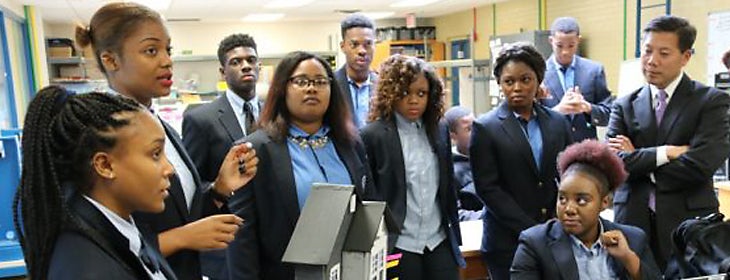
Deputy Labor Secretary Chris Lu hears from students at Phelps Architecture, Construction and Engineering High School in Washington, D.C. This unique public high school offers both college preparatory and vocational education dedicated to design professions and construction trades.
Filed in Apprenticeship Workforce Development, Youth By Eric Seleznow and Kim R. Ford on November 17, 2016
By offering pathways to career-ready skills, a paycheck and debt-free college credit, registered apprenticeship is the gold standard of work-based learning.
This program brings many high school students a future they never imagined. Bobby didn’t think he had many options after graduating from high school in rural Kentucky. Apprenticeship changed his life forever. During Bobby’s junior year of high school, he entered an apprenticeship program in advanced manufacturing with an employer in his hometown. After graduating, Bobby earned 30 college credits paid by the employer and completed over 1,700 hours of on-the-job training. Now, he works full time for the same company and is set to earn more money than his parents ever dreamed of for their family.
Employers see apprenticeship as a powerful tool for finding and developing talent. Parents and students see the value in a structured, earn-and-learn postsecondary pathway. Academic leaders see apprenticeship as a clear strategy for ensuring their high school and college graduates have the skills and competencies they need for tomorrow’s jobs.
While the average U.S. apprentice is 30 years old, other countries target younger workers. In countries like Germany, Switzerland and the UK, apprenticeships bridge the education system and the world of work, introducing high school students to jobs in a variety of industries. This European model enables students to connect to employment opportunities and access postsecondary education at an earlier age.
Successful registered apprenticeship programs across the country are connecting students to careers in critical, high-paying, in-demand industries such as IT, health care, and advanced manufacturing.
- In North Carolina, the NCWorks Youth Apprenticeship program offers high school students opportunities to earn credit for secondary Career and Technical Education coursework, college credits, and on-the-job training with a registered apprenticeship sponsor. After graduation, students complete their apprenticeship along with their associate degree, which is paid by the employer. Siemens and Ameritech are part of a consortium of employers that work with local high schools and Central Piedmont Community College on this workforce pipeline.
- In Wisconsin, the Youth Apprenticeship program, the oldest in the country, requires students to complete two years of 450 work hours per year and four semesters of related classroom instruction. Students work in advanced manufacturing with employers such as Harley Davidson and LDI Industries.
- In South Carolina, Apprenticeship Carolina has over 100 youth apprenticeship programs sponsored by different employers such as Agape Healthcare, IFA-Rotorion (advanced manufacturing) and Hull Hospitality Group (culinary arts). Students earn their registered apprenticeship certificate before or after high school graduation.
- The Tech Ready Apprentices for Careers in Kentucky (TRACK) youth pre-apprenticeship program is a business- and industry-driven program designed to create a pipeline for high school students to enter postsecondary apprenticeship training in manufacturing, welding, electrical work and carpentry. Employers are able to tailor the program for their specific needs and to select the career and technical education courses and students for their apprenticeship pathway. Students receive a nationally recognized credential at little or no cost.
As high schools and community colleges look for innovative ways to ensure students graduate with career-ready skills, registered apprenticeship is a ready-made solution. More employers can join this movement by partnering with local high schools. Interested in finding out how you can bring youth apprenticeship to your state? Check out the Office of Apprenticeship’s website for more resources and talk to your Office of Apprenticeship state director and CTE state director.
Editor’s note: Join the conversation about how #ApprenticeshipWorks during National Apprenticeship Week 2016 by using the hashtag on social media.
Eric Seleznow is the deputy assistant secretary of labor for employment and training. Kim R. Ford is the deputy assistant secretary of education for career, technical and adult education.